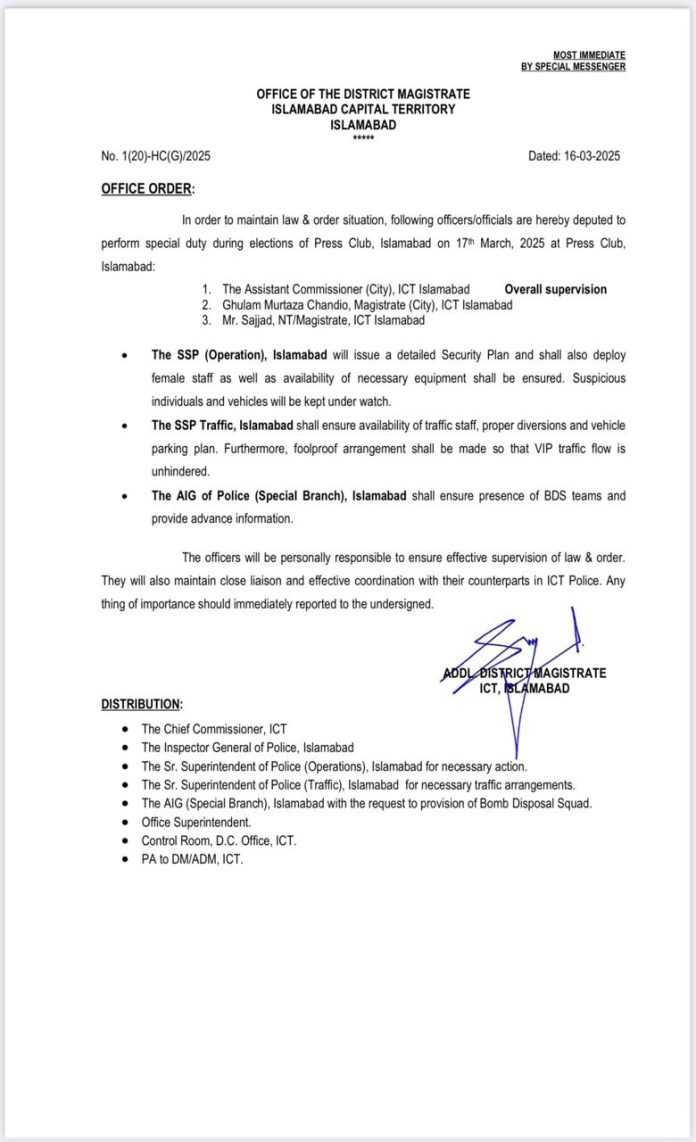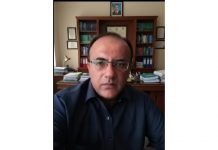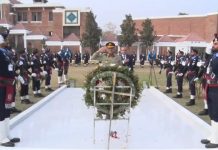(Asghar Ali Mubarak)
ISLAMABAD (TNS) The government has decided to convene a meeting of the National Security Committee of Parliament in the context of growing terrorism in the country. In which Prime Minister Shehbaz Sharif, top military leadership and heads of intelligence agencies will also participate. The meeting will also review the proposal for the renewal of the National Action Plan, decisions will be taken regarding the acceleration of operations against terrorists in light of the decision of the parliament. It should be noted that PILDAT has released the annual review report of the performance of the National Security Committee for the year 2024-25. The annual review of the performance of the National Security Committee issued by the Pakistan Institute of Legislative Development and Transparency (PILDAT) which indicates a disturbing trend in the government structure of Pakistan during the period from March 5, 2024 to March 4, 2025.
The National Security Council, which was established in 2013 as the primary forum for national security decision-making, did not convene a single meeting throughout the year. 2024-25 marked the first year since the establishment of the National Security Committee that the committee did not convene a single meeting.
Former Prime Minister Nawaz Sharif convened only eight meetings of the National Security Committee during his tenure in 2013-17, while Shahid Khaqan Abbasi (August 2017 to May 2018) significantly increased this number and on average, about 10 meetings of the National Security Committee were held every year. Former Prime Minister Imran Khan convened an average of three meetings of the National Security Committee annually in 2018-22, while Shehbaz Sharif convened an average of five meetings annually during his previous tenure in 2022-2023. However, last year in 2024, the current PML-N-led coalition government, which assumed power in March 2024, did not hold a meeting of the National Security Committee, especially despite the increasing security threats, especially in both Khyber Pakhtunkhwa and Balochistan, especially the occurrence of several incidents related to terrorism. The National Security Committee meeting of the Parliament will also review the implementation of the National Action Plan. A closed-door meeting of the parliamentary National Security Committee is likely to be convened on Thursday, chaired by Speaker National Assembly Sardar Ayaz Sadiq. The entire House will be converted into a security committee for the meeting, the top military leadership will be briefed on the reasons for the increasing terrorism in Khyber Pakhtunkhwa and Balochistan, while questions from members will also be answered. It may be recalled that on December 6, 2021, the government had announced the preparation of the first draft of the national security policy in the country’s history. The draft of the national security policy was prepared for the first time. The security policy includes the security of the country’s economy, food security, military security, water security, security of the economy, foreign policy, population growth and terrorism. It should be remembered that on December 24, 2021, former Senator Raza Rabbani had said that ‘negotiations were held with the banned Tehreek-e-Taliban Pakistan and it was said that a ceasefire had been reached, the state will have to tell on what conditions a ceasefire was reached with the TTP. Addressing the Senate session, Senator Raza Rabbani had said that Pakistan’s civil and military bureaucracy will have to be accountable to the parliament, the state cannot afford more secret agreements, he does not discuss whether the state’s policy towards Afghanistan is correct or not, but the banned TTP groups are reorganizing in Afghanistan which will spread terrorism, Raza Rabbani had stressed on the implementation of the National Action Plan and said that ‘the National Action Plan should be discussed again, it should be implemented, it should be remembered that Pakistan sacrificed more than 80 thousand lives in the war against terrorism and also suffered losses of billions. NDS helped RAW and India’s role in Afghanistan was very negative. India invested a lot in Afghanistan but its intention was not to help the Afghans but to harm Pakistan. India’s role in Afghanistan was negative and it poisoned the minds of the government, army and people there. No one expected the way Ashraf Ghani’s government ended in Afghanistan. After August 15, 2021, unexpected changes occurred in the situation in Afghanistan, including the fall of the Ashraf Ghani government. Before August 15, 2021, Afghan army personnel had entered Pakistan more than twice in search of a safe route. The Afghan army personnel were afraid of the Taliban. Pakistan sent them back in accordance with military rules and regulations.The Pakistan Army spokesperson has said that the security agencies are fully active against terrorism and are sacrificing their lives while performing their duties, but the 14 points of the National Action Plan are not being implemented. DG ISPR Lieutenant General Ahmed Sharif and Balochistan Chief Minister Sarfaraz Bugti addressed a joint press conference in Quetta and informed about the details of the terrorist attack on the Jaffar Express. The Pakistan Army spokesperson had said during the press conference that 354 passengers were rescued in the Jaffar Express train attack, while 26 people were martyred and 37 people were injured. He had clarified that the terrorists do not have any hostage passengers nor were any passengers killed during the operation. Those who were martyred were martyred by the terrorists before the operation. He had also clarified that the attack on the Jaffar Express took place in a very difficult area and route. The terrorists had destroyed the tracks and stopped the train with an explosion at around 1 pm on March 11. The terrorists were present outside in groups with the passengers. As a result of our firing on the terrorists, the kidnapped passengers got a chance to escape. The Pakistan Army spokesperson also clarified that this operation was carried out carefully, the Zarrar group rescued the hostages from the suicide bombers who were in groups. The terrorists had done all this with a big plan, they had the full support of their patrons and were in touch with their leaders in Afghanistan. With the timely action of the Pakistan Army, the terrorists and their masterminds failed to achieve what they wanted. The DG ISPR said that the root of this incident is Afghanistan, the suicide bombers come from there. While showing pictures of the three terrorists, he said that some time ago, an Afghan terrorist was killed during terrorism in Pakistan, his name was Badruddin and he was the son of the deputy governor of Baghdis province of Afghanistan. Similarly, another foreigner, Mujeeb-ur-Rehman, was a battalion commander in the Afghan Army. Afghan terrorists were also killed in the Bannu incident. This shows that Afghanistan has become a safe haven for terrorists and these activities are taking place under the nose of the Afghan government. He also made it clear that terrorism cannot be eradicated without implementing the 14 points of the National Action Plan. He said that we have conducted 11,654 operations so far this year, on average, this amounts to 180 intelligence-based operations per day. During 2024 and 2025, 1250 terrorists have been killed, 563 of our soldiers were martyred. The security agencies are fully active against terrorism, they are giving their lives, but these 14 points are not being implemented. A heated debate took place in the National Assembly session on the Jafar Express tragedy, terrorism, Balochistan issues and the government’s economic policies. The assembly members expressed serious concerns over unrest, unemployment and lack of basic rights in Balochistan, while emphasizing the need for national consensus to eradicate terrorism.















